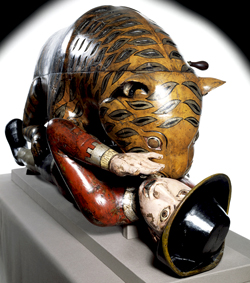Bengaluru,?Sep 12: Zoom in for an extreme close-up of ‘Tipu’s Tiger’, a life-size wooden semi-automation device made for Tipu Sultan during the 1790s.
 Capturing this image in ultra high definition, the Google Cultural Institute has made the exhibit—now displayed at the Victoria and Albert Museum, United Kingdom—accessible online. HD imagery of over 200 such artefacts linked to Karnataka are now part of this unique project.
Capturing this image in ultra high definition, the Google Cultural Institute has made the exhibit—now displayed at the Victoria and Albert Museum, United Kingdom—accessible online. HD imagery of over 200 such artefacts linked to Karnataka are now part of this unique project.
Culling out images from museums, galleries, magazines such as LIFE and other sources, the Google Institute has made the visuals searchable and fit for deep analysis with a clinical eye. A search for “Nandi, the Sacred Bull of Shiva” under ‘Mysore’ throws up the image of a stone sculpture in extreme detail, as realistic as displayed at the Philadelphia Museum of Art.
Visuals of Mysuru villages from a different era credited to the LIFE Photo Collection; images from old Bengaluru and Mandya; portraits of Shahs from the Adil Shah Dynasty of Bijapur are all part of this project. Designed to digitise and share the best of India’s heritage with the world, the visual online initiative is set to get bigger with the Institute’s tie-up with 10 new partner institutions countrywide.
Navigating through the site is easy once the browser stops at www.google.com/culturalinstitute. Search results could be refined by place, creator, medium, person, media-type and date.
The refined search results could get scaled up fast over the next few months. Here’s why: To source fresh material, the Institute has partnered with the likes of Salar Jung Museum, Victoria Memorial Hall Kolkata, DastkariHaatSamiti, Devi Art Foundation, Kiran Nadar Museum of Art, Academy of Fine Arts and Literature, Kalakriti Archives, Heritage Transport Museum, Sivananda Yoga Vedanta Centres & Ashrams, and the Ramamani Iyengar Memorial Yoga Institute.
Rising collection
Currently, the collection features over 2,000 new images and 70 virtual exhibits depicting ancient architecture to modern day contemporary art. Also included are 26 new virtual tours of sites such as the Ekattarso Mahadeva Temple and the royal saloon that once was part of the Palace on Wheels, captured using Google’s Street View technology.
To make the content even more accessible, DastkaariHaatSamiti, Devi Art Foundation, Heritage Transport Museum and Kalakriti Archives are launching mobile apps built by the Cultural Institute to showcase their exhibits.
The Institute director, Amit Sood explained the rationale behind this marriage of technology, heritage and art:?“Anybody with a mobile phone can now explore Indian culture through unique partner apps. Partners can also embed content on their website.”
Launched in 2012, the Google Cultural Institute had begun its India focus through partnerships with the National Museum and the National Gallery of Modern Art in Delhi. Worldwide, the Institute has tied up with 860 museums, foundations and archives in 61 countries.





Comments
In April 2008 a study carried out at Middlesex University found that World of
Warcraft had no link with increased aggressive tendencies.
With every year passing by; you grow, evolve into wiser and brighter self.
The Internet is the new vehicle for word-of-mouth marketing.
My weblog :: Chech
Reality Porn: http://petitami.es/?option=com_k2&view=itemlist&task=user&id=578473
Add new comment